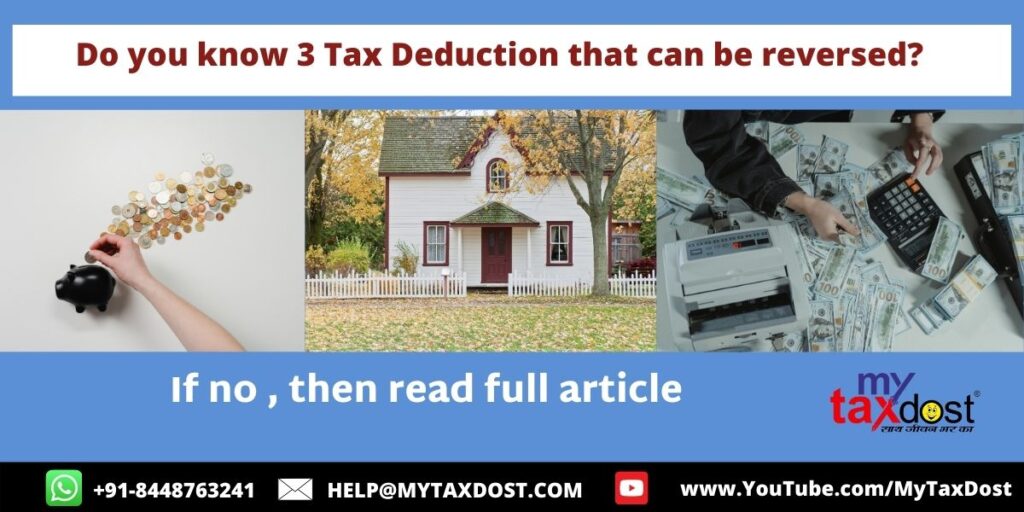Yes, Tax deduction can be reversed. It’s possible. Very few Taxpayers are aware of this fact.
Normally Taxpayers are aware of deduction they can claim from their income. Like 80C, 80D, 80G etc & Home loan Interest and principal repayment.
In Actual, if you go through Income Tax Act provisions closely, there are some terms and conditions attached with deductions.
In case you don’t follow them, Tax exemption/deduction can be reversed and you need to pay taxes on the same.
It might be shocking for many. But It’s true& in your interest to know about them.
Let’s discover-
- Home – Loan Principal Repayment- Individual takes a loan for the Home purchase and claim deduction up to Rs 200,00/- under section 24B of Income Tax Act against Interest payment and up to Rs 150,000/- under section 80C of Income Tax Act against Repayment of Principal.
What if you sell, Home before completion of 5 years from the date of Possession? Very few Taxpayers are aware, what should be the first action step in that case and how it can impact them in Taxes.
Almost Taxpayers are aware of Capital Gain Tax in such conditions that they need to Pay and plan strategically with a point of minimum Taxes maximum Wealth Maximisation.
Here is the Income Tax provision, if you sell your property before 5 years while claiming deduction of Principal repayment in earlier years. The same will be taxable.
It will be added to your income under the head income from other sources. However, a deduction for interest payment on the housing loan will be not be reversed.
Do check this point, while making the decision of House Property sale & filing your Income Tax Return.
- EPF withdrawal within 5 Years- Employee Provident Fund contribution is eligible for Tax deduction up to Rs 150,000 every year under section 80C. However, Employer Contribution is Tax-free up to Rs 7lac every year. Any amount above that will be taxable as Perquisite in the hand of Employee (As Amended in Finance Act 2020).
But if an employee, withdraws the money before completing 5 years of continuous service, then the deduction claimed at the time of contributing will be reversed and the amount so is withdrawn will be taxable under the head income from other sources and EPF department has the mandate to deduct TDS (Tax Deducted at Source) on such payments.
The worst part, even the employer’s contributions along with accrued interest thereon, which was exempted in earlier years, would be taxable under head salary as Profit in lieu of salary.
However, in case the employee has to withdraw EPF Amount in compulsion like
- Service is terminated due to his ill -health, or
- Closure of the business, and
- Reasons beyond employees’ control (like Covid 19 – Lockdown)
Then he has not to pay any Tax. Such withdrawals will be Tax-free
Hope you feeling more aware of tax law and particular to your contribution and withdrawal of EPF.
- Surrender of Life Insurance Policy – Premium paid for Life Insurance (Normal or Term) are eligible for tax deduction under section 80C of the Income Tax Act. This deduction is very common& force many taxpayers to take Insurance policy.
Especially, in March every year as 31st March is the last date to have any Tax saving investment. The maximum deduction is up to Rs 150,000 for Insurance.
Here, an important point, Insurance can be taken in name of self, spouse, or dependent kids.
(Importance of Life insurance, we will discuss in our Insurance section in detail. Please read articles in the insurance section for more details)
Key Point, what if you surrender insurance policy? It will be taxable if you surrender within 2 years and all deduction claimed in the last 2 years will be taxable in the year in which the policy is discontinued.
The worst part, if you surrender within 1 year, you will get zero surrender value, and in 2nd / 3rd year onward can expect some Value like 30% of Premium paid.
Subject to TDS (Tax Deducted at Source) from the insurance company.
Hope you get some more insight on your Insurance policy, its surrender, and taxation.
Conclusion – Plan your Tax transaction carefully to minimize Tax and Maximisation of wealth. Don’t take any action without complete knowledge of Tax laws and procedures.
It’s recommended, to take the advice of any Qualified Tax Professionals.
Keep reading and learning about Taxation & Personal finance. Best Wishes from Team MyTaxDost.
MyTaxDost also provides Tax Consultancy services. If you like to opt then click

